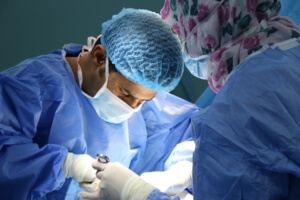Thinking of Cosmetic Surgery Abroad?

Contact
Table of Contents
Cosmetic Surgery Abroad Checklist
People from the UK travel abroad for plastic surgery, as on the face of it, it can cost substantially less than paying for private treatment at home. However, the cost is not the only factor you should consider before booking an appointment. Including the risk that cosmetic surgery goes wrong.
Important Details to Consider Before Traveling for Cosmetic Surgery
Below are a few important details that you should bear in mind before stepping onto that flight:
1. Selecting your cosmetic surgeon and your hospital
In the UK, cosmetic surgeons must be appropriately qualified and adhere to high standards of practice. The specialist register for plastic surgery is held by the UK’s General Medical Council so you can readily check if your surgeon is legitimate. However, other countries use different systems for registering plastic surgeons and may even have different standards of practice and qualifications.
So, if you are opting to travel for your cosmetic surgery, do your research. The Royal College of Surgeons advises that you should meet your potential surgeon face to face before you agree to any cosmetic surgery procedure abroad. Reassure yourself that your surgeon is qualified and sufficiently experienced in your chosen procedure.
If you can, get testimonials from past patients or ask for a selection of before and after photographs, to satisfy yourself that the surgeon is right for you. Request details of your surgeon’s insurance – this will inform you whether the surgeon is covered to perform your chosen procedure, or not.
The Royal College of Surgeons also advises that you should visit the hospital where your procedure will take place before you finally commit to surgery abroad. Private hospitals in the UK are regulated by the Healthcare Commission which ensure a high standard of cleanliness. Clinics abroad may not have similar regulation, so check out the standards of upkeep and hygiene for yourself.
When doing your research, you should be especially cautious of any hospital that advertises cosmetic surgery tourism, namely providing cosmetic surgery as part of a holiday package deal (1). In these cases do not be palmed off by salespeople and their sales pitches. Speak to the clinicians directly and visit the hospitals and clinics yourself.
2. Pre-treatment consultation
The pre-treatment consultation is an opportunity for the surgeon to examine you and determine if your desired procedure is suitable for you. It is also a time for the surgeon to explain what the surgery involves, including any risks and complications. If you have questions, make a list and bring it with you – that way you will not forget something important.
Bear in mind, if you are going abroad for your surgery, there could be language difficulties, which could affect the communication and understanding between you and your healthcare providers. You could request a translator and a repeat appointment if you were not content how the initial consultation proceeded.
Note that after the consultation, you should also be given a period in which to change your mind, known as a cooling-off period. In the UK this period is typically two weeks.
3. Aftercare following cosmetic surgery
Any surgical procedure has risks. Problems can occur during the operation, or days afterwards. Additionally, it is generally considered to be unsafe to fly immediately following an operation, as there is an increased risk of developing a blood clot. So, after your cosmetic procedure, you will likely have to stay in a hotel or hospital for several days before you can go home.
For your safety it is important to establish exactly what is provided in your aftercare programme, including what happens if something goes wrong in the days after your surgery. Immediately after your surgery, you should be monitored by qualified medical staff no matter where you are staying. So, you need to make sure that your chosen cosmetic surgeon will follow you up to ensure that you are healing well and to trouble shoot any potential problems as they arise. Remember, if something goes wrong, it can go wrong quickly, and you could end up in serious trouble.
Complications and problems can arise once you arrive home, but unless you develop a life-threatening condition, it is unlikely that the NHS will step in. So, make sure you clarify what after-care is available to you on your return home. For example, you may require revision surgery: will you have to pay more for it and how will travel and accommodation costs be covered?
4. Costs of cosmetic surgery overseas
Clarify all the costs involved, including provisions if something goes wrong. Find out what happens if you change your mind and you have already paid towards the procedure. Cosmetic procedures may be cheaper abroad, but when you factor in additional costs such as travel and accommodation, your savings may be much less than you anticipated. More importantly, by going abroad you may also be trading safety for the saving of a few pounds.
5. Travel insurance for cosmetic surgery abroad
You should establish that the surgeon and the hospital carry insurance to cover your procedure.
If something goes wrong injured person can bring a claim directly against the insurance company, from the UK. Court proceedings can only be issued in the UK against the insurance company. If there is no insurance in place the injured person can only sue the specialist or the clinic in the country where procedure was carried out. UK courts do not have jurisdiction if there is no insurance.
Find out exactly what is and is not covered, such as medication, aftercare, and revision surgery.
In addition, you should clarify what your own travel insurance covers – you may need to take out specialist insurance to cover travelling abroad for cosmetic surgery.
6. When cosmetic surgery goes wrong
If cosmetic surgery goes wrong you may be left with not only physical scars but, emotional scars too. You may also be suffering a financial burden that needs to be addressed. For many, the next step and best approach is to seek compensation for medical negligence and assistance with gaining any further care and treatment that may be needed. A specialist cosmetic lawyer will help you to get your life back on track.
Speak to a specialist cosmetic surgery claims lawyer
Are you considering travelling abroad for cosmetic surgery? Before you book your appointment, make sure you’re fully informed. Read our comprehensive guide on what you need to consider to ensure your safety and satisfaction. Don’t take unnecessary risks—arm yourself with the knowledge to make the best decision for your health and well-being. Click here to learn more and make an informed choice!
Share this article
“Small but very effective and experienced team so every client benefits from the personal touch but also highly skilled litigation know-how. Capability of the team means they can handle all aspects of very complex cases as well as straightforward matters.”
“Osbornes Law is an established firm which handles a breadth of complex and high-value clinical negligence matters.”
Contact us about a Cosmetic Surgery Claim
Call us 020 7485 8811
Email us Send us an email and we’ll get back to you
Related InsightsVIEW ALL
- 10.7.2025
Osbornes Law Secures £700K in Crohn’s Negligence...
Negligent delay in diagnosing Crohn’s disease leads to £700K settlement Jodi Newton, Partner, was instructed in a case against...
Read more - 13.5.2025
Damages Recovered for Necrotic Pressure Sore
Elline Demetriou recovers damages following a necrotic pressure sore on her client’s heel Elline Demetriou, Solicitor in our clinical...
Read more - 12.5.2025
Complaints Against Suspended Surgeon Ms Kuldeep Stohr
Ms Kuldeep Stohr, orthopaedic surgeon at Addenbrooke’s Hospital suspended In February 2025, Cambridge University Hospitals NHS Foundation Trust (CUH) confirmed...
Read more - 6.5.2025
Six-Figure Settlement for Negligent C-Section Delivery
Osbornes secures a six-figure settlement following a negligent caesarean section delivery Jodi Newton, Partner and head of our Obstetric and...
Read more - 6.5.2025
Six-Figure Settlement for Negligent Shoulder Surgery
Settlement following a claim against Bedfordshire Hospitals NHS Foundation Trust Elline Demetriou, a Solicitor in our clinical negligence team, acted...
Read more - 29.4.2025
Five-Figure Settlement in Fatal Medical Negligence Case
Osbornes Law secures a five-figure compensation following a fatal medical negligence claim Osbornes acted for our client, E, who brought...
Read more - 4.4.2025
Time To Move On From Physician Associates?
BMA raises concerns over patient safety: the risks of Physician and Anaesthesia Associates in the NHS The British Medical Association (...
Read more - 13.3.2025
Addenbrooke’s Hospital Complaints
Review finds harm to children by surgeon at Addenbrooke’s Hospital An independent review by Cambridge University Hospitals NHS Foundation...
Read more - 4.2.2025
Claim Settled for Child’s Surgery Injuries
Osbornes secures settlement for child’s surgery-related injuries Osbornes Law successfully represented a minor, X, in a claim against two...
Read more - 29.1.2025
£27,000 DVT Claim Settled Against Royal Free London NHS
Successful settlement for DVT case against Royal Free London NHS Foundation Trust Successful Settlement of £27,000.00 for DVT Claim against Royal...
Read more - 14.10.2024
Multi-Million Settlement in Cerebral Palsy Negligence Case
Judge awards multi-million settlement in cerebral palsy medical negligence claim Jodi Newton, Partner and specialist medical negligence lawyer at Osbornes...
Read more - 19.9.2024
Report highlights failings in maternity care
The Care Quality Commission (CQC) has recently carried out a national review of 131 maternity inspections between 2022 and 2024, finding that failures...
Read more - 12.9.2024
Great Ormond Street Hospital Negligence & How to Claim
Review of negligence at Great Ormond Street Hospital At Osbornes Law, we’ve supported families through some of the most...
Read more - 29.8.2024
AB v Central London Community Healthcare NHS Trust
Background Our client, AB, had been using the Nexplanon contraceptive device for 6 years. She had a Nexplanon device inserted into...
Read more - 30.7.2024
What Is the Role Of a Physician Associate?
What does the Position of Physician Associate Mean for the NHS? There are many different jobs within the NHS, each...
Read more - 17.7.2024
Settlement for Delay in Wrist Fracture Treatment
Our Clinical Negligence team have recently agreed the settlement of a case relating to a delay in the treatment of...
Read more - 28.6.2024
£55,000 Settlement for Stillbirth Claim Against Chelsea and Westminster...
Successful Settlement for Stillbirth Claim Against Chelsea and Westminster Hospital NHS Foundation Trust Background Nick Leahy, an Associate in our...
Read more - 9.5.2024
Claim Against Royal Free London NHS Foundation Trust...
Client obtains settlement after being victim of a surgical negligence Jodi Newton, Partner in our Clinical Negligence department, recently settled...
Read more - 30.4.2024
Settlement In Neonatal Death Case
Settlement in fatal medical negligence case against King’s College Hospital Nick Leahy, Associate in our Clinical Negligence department, recently...
Read more - 8.4.2024
Epilepsy Negligence Compensation Claim
Nicholas Leahy, an Associate in the Clinical Negligence team at Osbornes Law, has recently settled a long-running fatal medical negligence...
Read more - 11.1.2024
New UK Supreme Court Ruling regarding Secondary Victims...
The Supreme Court has today, on the 11th January 2024, upheld the Court of Appeal’s order to dismiss the claims...
Read more - 11.1.2024
Secondary Victim Claims
Secondary victims in clinical negligence cases What is a secondary victim in clinical negligence cases? Most compensation claims are concerned...
Read more - 5.1.2024
Delayed Pre-Eclampsia Diagnosis Results in Loss of Baby
Introduction to the case Nick Leahy, Associate in our Clinical Negligence department, has recently settled a birth injury claim against...
Read more - 12.12.2023
NHS Compensation Payouts Guide
What Are NHS Compensation Payouts? In the UK, the National Health Service delivers the vast majority of healthcare services. When...
Read more


























